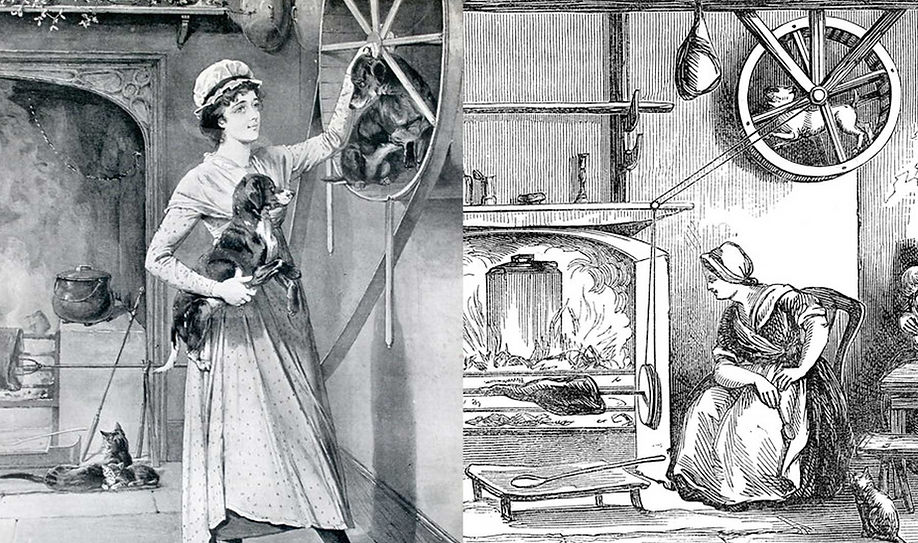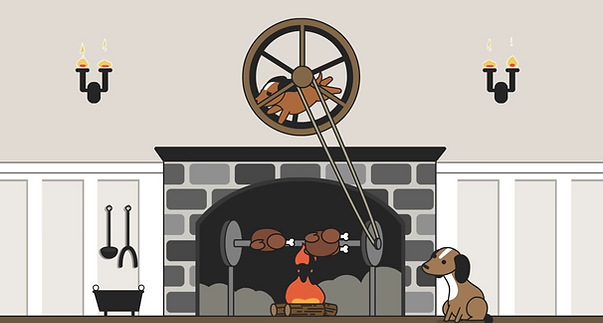Creature
Fast Facts
Introducing you to extinct species.

THE
TURNSPIT DOG
1. The turnspit dog was an elongated, short-legged dog that was bred to run in a wheel on the wall that turned the spit to cook meat over the fire. A family would own two turnspits, one for running in the wheel to turn the meat and the other to lay down to warm the people’s feet. 2. The turnspit was also used as a “tool” for other tasks like pressing cider, churning butter, pumping water, and working in grain mills. 3. The "Turnespete" was first referenced in 1576. It was also called the Kitchen Dog, Underdog, Vernepator, Wheeling Dog, or Cooking Dog. 4. The turnspit was 8 - 12 inches high and weighed 15 - 25 pounds. 5. The breed’s exact makeup is unknown but according to Bingley's Memoirs of British Quadrupeds (1809), it was “remarkable for their great length of body and short and usually crooked legs. Their colour is generally a dusky grey spotted with black or entirely black with the under parts whitish.” Another account said the turnspit were, “"long-bodied, crooked-legged and ugly dogs, with a suspicious, unhappy look about them." 6. The spit jack was mentioned in Shakespeare’s play The Comedy of Errors. He describes somebody as being a "curtailed dog fit only to run in a wheel." 7. Hannah Penn, wife of Pennsylvania founder William Penn, wrote to England to order a turnspit wheel. Benjamin Franklin advertised them in his newspaper, Pennsylvania Gazette. 8. “Whiskey” is the only known preserved example of a turnspit dog. It is on display at the Abergavenny Museum in Abergavenny, Wales. 9. The turnspit wasn’t treated like a pet as much as it was part of the turnspit mechanism. They had great endurance, but were often mistreated. There are some accounts of people throwing hot coals in the wheel if the dog slowed down. This mistreatment led to the founding of animal rights activists speaking up on their behalf. 10. Queen Victoria kept retired turnspits as pets. 11. Nobody knows for sure how the turnspit was created, but it is thought to be a mix of Welsh corgi, dachshund, and a terrier breed. 12. The turnspit dog went extinct around 1900 when its job of turning the spit was taken over by a machine called the “clock jack” which used the heat from the chimney to turn the spit over the fire.
Extinction
Cometh
Facing the light at the end of the tunnel
EXTINCTION DATE
1576 - 1900
The turnspit dog breed’s exact origins are unknown. Even though it was a very common breed of dog, records were not kept about how it was created. It is thought to be related to the dachshund because of its elongated body, but others have speculated it was a type of terrier or relative of the Welsh corgi. It was first mentioned in 1576, and was bred to take over the tedious job of roasting meat. Until its creation, the multi-hour task was given to a servant called a “spit-jack” or a young child. The turnspits were placed in a wheel that hung from the wall. The wheel was connected to a pulley system that turned the meat over the fireplace. Because it was a long job, each family would have two turnspits. One would run continuously in the wheel, and was treated as part of the machine. The dogs would even voluntarily trade places to keep the wheel spinning. The one awaiting its turn was used to warm a person’s feet. In fact, people took turnspits to church to keep their feet warm there as well. Because turnspits were seen as a “tool” more than a pet, they were often mistreated. There were reports of people throwing hot coals in the wheel to make the dog run faster. The mistreatment of the turnspit by owners led to a movement to fight for animal rights and proper treatment. It gave rise to organizations like the SPCA. With the invention of the clock-jack, a machine that used the heat from the chimney to turn the spit, the turnspit breed was no longer needed. By 1900, the turnspit breed was extinct. Although Jurassic Park is fiction, scientists are working on several de-extinction projects. In fact, in 2003 scientists did bring back the extinct Pyrenean ibex, a type of wild goat, for 7 minutes before it died, showing de-extinction is possible. The turnspit dog breed might be a candidate for de-extinction. Scientists would potentially use DNA from Whiskey, the lone surviving specimen of the once widely owned work dog. If the spitjack breed was brought, would it still be used to warm people’s feet at church or would people find a new use for this once common house dog?
COMING
SOON
The turnspit dog's Lazarus Tale has yet to be written. Would it be able to thrive if it did return & what job would it do?
More to Explore
All answers lead to more questions

"Whiskey" is the only known preserved specimen of turnspit breed
Image from Peoples Collection Wales
VIDEOS & ADDITIONAL INFO
Turnspit Dog - Dog Breed Facts
The Curious Tale of Turnspit Dogs - Video
Extinct Dog Breeds - Dog Zone Article
Extinction: The History of Lost Dog Breeds
A Brief History of Dogs: How We Domesticated Dogs

The turnspit dog was bred to run on a wheel to evenly cook dinner on a roasting spit in homes
Image from NPR

Before turnspits were created, the process of slowly roasting meat over the fire was the job of a servant or a young child. Two turnspits would be used in alternating shifts to run on the wheel to cook the meat and then warm people's feet
Image from Super Curioso

The turnspit is one of over 50 extinct breeds of dogs. Since the process of creating certain breeds wasn't always well documented, many of these breeds might be impossible to recreate
Image from Stuff I Learned - YouTube

Image from Unbelievable Facts Blog & the BBC

Cartoon of the turnspit dogs doing their job roasting chickens over a fire
Image from YouTube's "A Brief History of Dogs: How We Domesticated Dogs"

The Hare Indian dog was a breed used by the Hare Indian tribe in Northern Canada for hunting. It was thought to be a mix of coyote and a Viking dog breed. It went extinct when modern hunting techniques began being used by the Hare Indian tribe
Image from "The Viviparous Quadrupeds of North America" by John James Audubon and John Bachman



